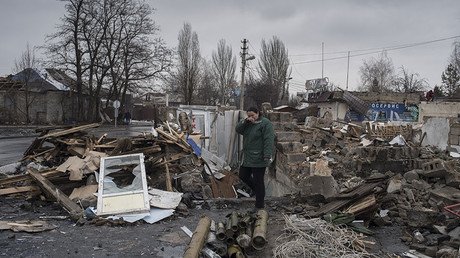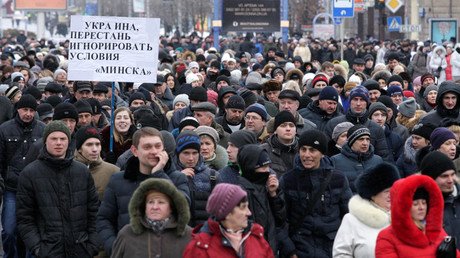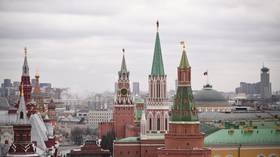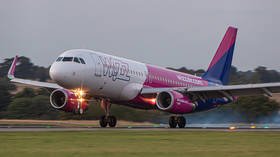No need to include US in Ukraine peace talks, German FM says

German Foreign Minister Sigmar Gabriel says he sees no need to add the US to the current format of four-way ministerial meetings concerning the Ukraine settlement, noting, however, that close contact with Washington on the matter is “necessary.”
“There must be close contact with the United States, but we think this [Normandy] format... should be maintained,” Gabriel said after he met with his Russian, French, and Ukrainian counterparts on the sidelines of the Munich Security Conference on Saturday. The Minister added that the matter had been discussed with US Secretary of State Rex Tillerson, and that he had “agreed with this.”
There have been reports of possible expansion of the four-way Normandy format by adding other countries to the peace process in the east of Ukraine, primarily the US. Most recently, former Ukrainian President Leonid Kravchuk said that the Normandy format must be taken to a new “higher level” with the participation of the US.
Ukraine's representative to the Trilateral Contact Group for Donbass (the name commonly used for the breakaway Donetsk and Lugansk regions in eastern Ukraine), former Ukrainian President Leonid Kuchma, said in December last year that Russia's stance was an obstacle to including the US in the Normandy format. However, Russian President Vladimir Putin recently said that Moscow does not oppose the inclusion of other countries, including the US, in the talks.
Germany, France, Russia, and Ukraine on Saturday talked mostly of the recent escalation in eastern Ukraine and ways to stem the violence. The sides agreed to use their influence to introduce a new ceasefire and facilitate the withdrawal of heavy weapons in the region starting Monday.
“We have reached several agreements. All sides have agreed to use their influence to implement the decisions made by the trilateral contact group on February 15,” Sigmar Gabriel said, as cited by Reuters. The group comprises Ukraine, Russia, and the Organization for Security and Cooperation in Europe (OSCE), and aims to facilitate the peace process.
“The aim is to have a ceasefire starting from February 20 and to do what has long been agreed but never implemented: to withdraw the heavy weapons from the region, to secure them and enable the OSCE monitors to control where they are kept,” Gabriel added. He noted also that the Normandy group will meet again soon to start preparing the launch of the political settlement process.
“We are going to meet in a few weeks for preparations of the political process, which will be the hardest task. But the political process cannot be started without a ceasefire and pullout of heavy weapons,” the minister concluded.
Russian Foreign Minister Sergei Lavrov said on Saturday that Russia has been actively supporting the decision to introduce an immediate ceasefire.
“On February 20 the ceasefire regime will start and withdrawal of heavy military hardware will also start... We have actively supported this decision and obviously expressed a conviction that this time, failure should not be allowed,” Lavrov said after talks with his counterparts, adding that he believed both Kiev and the rebels would abide by the February 20 date. He noted, however, that the talks failed to bring about all the anticipated results.
Ukrainian Foreign Minister Pavlo Klimkin said he was “not at all” happy with Saturday’s talks and complained about a lack of “powerful results,” speaking to Reuters after the ministerial meeting.
READ MORE: Dealing with damage: Locals in Donetsk clear debris after days of shelling
French Foreign Minister Jean-Marc Ayrault said the meeting showed the Minsk deal was seen as the only way to peace in Ukraine.
“The meeting showed that Russians and Ukrainians had no other option but to respect Minsk. They have no alternatives. We agree to meet quickly, perhaps in three weeks, to see if we can advance on the ceasefire, withdrawal of heavy weapons and exchange of prisoners. We need a lot of patience, because we can see a lack of will on either side,” Ayrault said.
Kiev authorities launched their military operation against militias in the Donbass region after the coup in Kiev in 2014. In 2015, the two sides reached a ceasefire deal brokered by the leaders of the Normandy Four and signed the Minsk peace agreement, the main document currently regulating peace efforts in eastern Ukraine. It calls for a ceasefire, the withdrawal of heavy weapons from the contact line, and constitutional reform, aimed mostly at expanding the autonomy of the Donetsk and Lugansk regions.
Throughout 2016, the Normandy Four, as well as the OSCE, stressed the need to implement the Minsk agreements, but Kiev has stalled these efforts, refusing to grant Donbass special status. The effort is also being held up by a resurgence in fighting. Since the end of January, shelling on both sides of the contact line near the government-held town of Avdeevka has been heavier than at any time since the summer of 2016, according to the OSCE.















